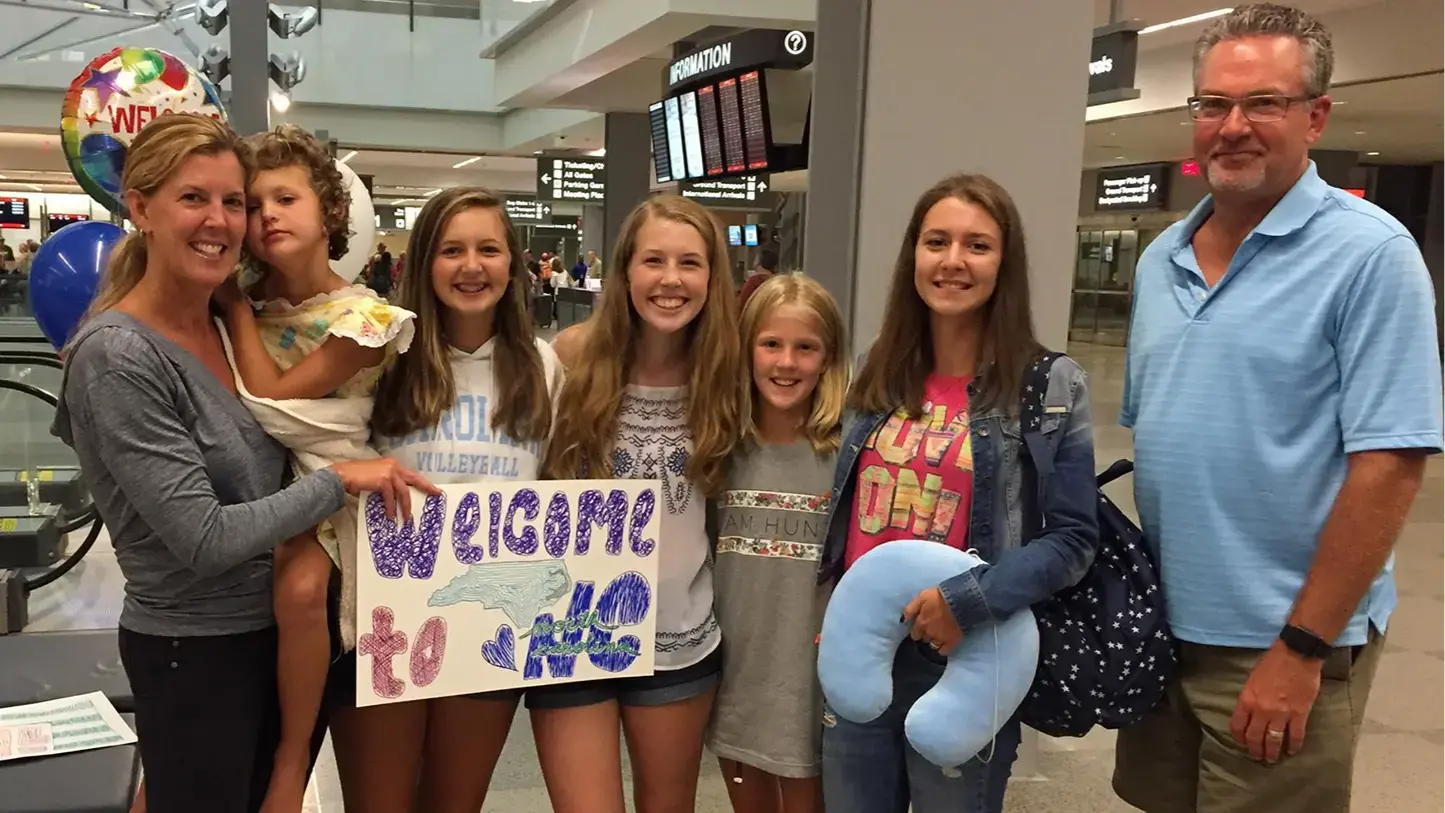Who Are Host Families? / Что такое Host Family?

Who Are Host Families?
THANKSGIVING AND DISH DUTY
HOST FAMILIES ARE VOLUNTEERS
Going to another country as an Exchange Student means a lot of adjusting: new customs and traditions, new area and school, new friends. And a new family?
What is your relation to the Host Family, why do Americans decide to welcome international students in their homes, and do they get paid for that?
First of all, they do not! All the Host Families are volunteers. They do not get any financial benefit from hosting a student from overseas. Most of the experienced Host Families say that the main reason for doing so is the unique experience they get from opening their home to an Exchange student.
Spending a year back to back with a foreign student brings a lot of joy and discoveries to the Host Family members. For them this is a wonderful opportunity to see their own country from a completely new angle and learn a lot of new things about it along with their student’s cultural journey. An Exchange Student becomes so much more than a guest to their family – they become a new family member. Learning how to live with an American family is an important part of a cultural exchange. Not only is it an opportunity to get to know the USA from a local’s perspective but also a great chance to build a life long relationship and make the warmest memories together.
WHAT IS EXPECTED OF YOU AS AN EXCHANGE STUDENT?
Usually the main thing a family is expecting of you is to be open to them and share your experience and impressions. When Americans decide to host a student from another country, they hope to learn about the foreign culture just as much as a student does. That is why it is so important to communicate with your Host Family. They are really curious about customs and traditions in your home country, especially the ones that are completely different from their own. Speaking about you being open to your Host Family, do not ever hesitate to ask questions! It is always better to ask to repeat something than to get it completely wrong or be left in doubt.
Another important thing is making yourself a family member, not a guest. Host Family is going to be by your side at all times while you are going through all the stages of cultural shock and adjusting to the new. They are not only your home to stay at but your support system and people you can trust and rely on. You will celebrate Christmas and Thanksgiving, have breakfasts and dinners, and plan the winter break together. Do your best at enjoying the time with your Host Family and appreciate everything they do for you. If there is any kind of misunderstanding, resolve it by having a conversation – there is no better way to communicate a problem than talking about it right away.
Following your Host Family’s customs and rules is another major key to building a good relationship. When people welcome you to their country and to their home, they expect you to be respectful of all their traditions and regulations which include but are not limited to doing household chores, respecting the curfew, taking part in family’s daily life etc. Always remember to be respectful of all the belongings you use in the house, too.
WHAT YOU GET FROM STAYING WITH A HOST FAMILY?
The biggest advantage of staying with a Host Family is the complete integration into the casual life of Americans. Your experience will not consist of watching people live their lives “American way” – you will be one of them doing it. An Exchange Student is not a tourist or a visitor but a family member from the minute they are picked up from the airport. From that exact moment, they are a part of an American community which they enter through the Cultural Exchange Program – more specifically, through their Host Family.
For a lot of Exchange Students, their Host Family becomes their “home away from home”. The care, conversations, fun weekends and cozy evenings by the fireplace become even more meaningful for those who are temporarily away from everything they are used and attached to. Host Family also makes the adjusting process a bit easier by providing a student with support and basic guidelines. Even overcoming language barrier is so much easier when there is someone by your side to answer questions, explain things and translate the untranslatable. Your Host Family will become your caring guide to the new environment and always be there to help.
YOU LEARN PROBLEM SOLVING IN REAL LIFE
You learn Problem Solving in real life
Entering a new family whose customs are different from those you are used to involves a lot of adjusting. In order to communicate properly and avoid misunderstanding, you should learn how to correctly express your opinion, compromise and negotiate. For many of the students this is their first time building a relationship with adults who are not their parents, which can be a little challenging. You have to be 100% responsible for what you say and do, have flexible views, be polite and ready to compromise. However, you should also know your boundaries and not let anyone break or invade them.
It is drastically important to remember that, although you are not a kid, you are still underage and your Host Family is fully responsible for your safety and security. This is why you should follow all the guidelines and recommendations they, or other authoritative adults, give you at all times. Also, do not forget that your independence level might, and is likely to, be different from the one you had back home. First, in the United States most teenagers are not given as much freedom as in some other countries. This means you will be independent and away from home on your own but can still face the limits you did not have before. Second, there are a lot of people responsible for you, a lot of rules created to keep you safe – they are this way for a reason. Adjust to all the regulations and try to live a life of an American teenager while you’re on program. Do not insist on making things go your way – this is definitely not the goal of the Exchange Program.

ЧТО ТАКОЕ HOST FAMILY?
С КЕМ ТЫ ОТМЕТИШЬ ПЕРВЫЙ В СВОЕЙ ЖИЗНИ THANKSGIVING И КТО БУДЕТ МЫТЬ ПОСУДУ
ДЛЯ АМЕРИКАНЦЕВ ЭТО ФОРМА ВОЛОНТЕРСТВА!
Американцы настолько гостеприимны и открыты всему новому, что берут студентов по обмену исключительно ради опыта.
Хост-семья приглашает к себе студента и не получает за это никакой финансовой компенсации: только удивительное приключение с множеством открытий, которое они проживают вместе с иностранным гостем – новым членом их семьи. Проживание в хост-семье — очень значимая составляющая культурного обмена. Только с позиции настоящего “local” ты сможешь узнать об Америке в миллион раз больше, чем со страниц всех в мире блогов и путеводителей.
Только так сможешь погрузиться с головой и прожить этот опыт – уникальный и незабываемый.
ЧЕГО ЖДУТ ОТ ТЕБЯ?
Этот вопрос был задан всем хост-семьям, с которыми удалось встретиться, говорят: ради интереса. Прожить год с человеком из совершенно другой культуры – действительно очень увлекательно. Начиная с того, что даже посуду мы моем по-разному, заканчивая возможностью посмотреть на свою страну глазами гостя с другого континента.
Но в хост-семье ты – больше, чем гость.
Хост-семья – это люди, с которыми ты будешь каждое утро делить american breakfast, те, кто будет провожать тебя на желтый школьный автобус, те, с кем ты отметишь свои первые Thanksgiving и Christmas. С ними ты проживешь всю свою американскую историю: от выхода из аэропорта до линии паспортного контроля на обратном пути – они станут твоей поддержкой, твоими главными проводниками в новую, совсем тебе незнакомую, реальность. Вы вместе пройдете все стадии культурного шока, будете смеяться, плакать, спорить, искать компромиссы, и, конечно, никогда не забудете этот год.
ПЛЮСЫ ЖИЗНИ В HOST FAMILY
Главное преимущество жизни в хост-семье — абсолютное включение в новый быт, не просто наблюдение за незнакомым образом жизни, а существование в нем 24 часа в сутки.
Студент по обмену – это не гость в Bed&Breakfast, это член семьи, со своими обязанностями и правами, со своей очередью мыть посуду и выгуливать собаку.
В разных семьях, конечно, все устроено по-разному, но их объединяет полная “непохожесть” на то, к чему привыкаешь у себя в родной стране. Например, среди большинства американцев принято посещать церковь каждое воскресенье. Кроме значимости этого дня с религиозной точки зрения, это еще и момент настоящего семейного единения.
Для многих студентов по обмену хост-семья становится “home away from home” – вторым домом. Забота, душевные разговоры, уютные выходные вместе – все это невероятно важно, особенно когда находишься далеко от дома. Гораздо проще адаптироваться, когда рядом есть те, кто готов помогать и поддерживать. Даже с точки зрения языка: именно у семьи всегда можно уточнить, если что-то смущает, именно они первыми привыкнут к твоему акценту и помогут “разговориться”.
Еще один плюс: ты входишь в американское общество не просто как иностранец, но как член конкретной семьи.
Это хорошая база, на которой можно строить взаимоотношения, заводить знакомства – networking как он есть.
ЧТО ТЫ ПОЛУЧИШЬ ОТ ЭТОГО ОПЫТА?
Интеграция в хост-семью не только открывает горизонты американской культуры, но также учит строить диалог, корректно высказывать свое мнение, находить компромиссы. Для многих это становится первым опытом самостоятельности, и нужно быть готовым адаптироваться и ответственно относиться к своему поведению.
Не всегда ваши с хост-семьей точки зрения будут совпадать, и это нормально. Нужно помнить, что ты входишь в уже существующую систему: нельзя нарушать ее баланс. Конструктивный диалог – ключ от многих проблем: не нужно бояться говорить о том, что тебя беспокоит. Возможно, эти разговоры будут не самыми простыми, но вместе с хост-семьей вы найдете компромисс.
Вы проведете вместе весь учебный год, поэтому установить взаимопонимание очень важно.
Главное негласное правило программы: быть открытым ко всему новому. Если держать его в голове, можно гораздо проще справиться с возникающими трудностями и больше впитать этого уникального опыта жизни в другой культуре, в другой семье. Будь то непривычный быт, другой уровень самостоятельности, или новые правила – все гораздо лучше воспринимать с любопытством и интересом.
Если бы целью программы было отправить ребенка “просто поучиться в школе”, она бы не называлась культурным обменом.

